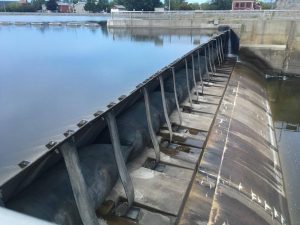By Andrew Harper [4] and Justin Medve [5]
BELLEVILLE – The Quinte Region is still experiencing a record dry season after months of high temperatures and little rain.
Clifford Foster of Fosterholm Farms [6] says he’s never seen anything quite like it.
“I’m 85-years-old and I’ve been on the same farm as my parents were in 1924. I’ve seen it dry from this time of year on or even in August, but not all summer,” he said.
Foster says he spends $400 per trip transporting water from Lake Ontario [7]. He says he’s had to use even more of that water to keep his crops wet.
“We spent a lot more time irrigating than we would normally,” he said.
However, Foster is lucky he gets his water from out of town.

A dam along Moira river without flowing water. Photo by Justin Medve, QNet News
Local streams, creeks, rivers and lakes have lost water to the point of no longer flowing, leaving nearby water sources at risk of running dry.
This evaporation is evident on the Moira River, where pedestrians have taken to fishing in low water and geese have taken to perching on rocks.
Conservationists and city officials have issued low-water level warnings [8]. A local response team is formed when the first of these warnings comes into effect.
Quinte Conservation [9] rep Jennifer May-Anderson says the team “comes together and tries to strategize about ways that local water users can reduce demand and mitigate the effect of water shortages.”
One of these strategies is simply urging the public to reduce their water usage. A 10 per cent reduction was the earliest suggestion, but that number rose to 50 per cent over the course of summer.
Although the City of Belleville has no water conservation by-laws in effect, Perry Decola of Belleville Water [10] said the public has taken these warnings seriously.
“The people did respond by reducing consumption by 50-million litres for the month of August,” he said.
That’s a modest 6.5 per cent reduction from July’s usage, which Decola says is usually the highest month for water consumption.
Janet Noyes, Lower Trent Conservation [11] Watershed science and services manager, said what Quinte really needs is several days of sustained rain.
“When you have higher temperatures, you also have higher evaporation,” she said. “So when you don’t have cloud cover and you’ve got lots of sun, not only is rain not falling down enough, there’s more going up.”
Noyes says there’s no relief in site with what looks to be a warm and dry fall ahead. Low water could have an impact into next spring, but more alarming is the possibility of wells freezing this winter.
The last drought [12] in the Quinte Region dates back to 2012, but only reached a level two low-water warning compared to the level three warning it has now.
Here’s how you can help:


